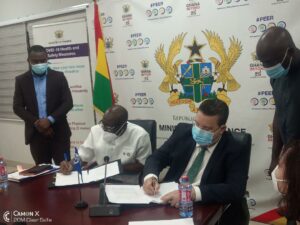Ghana, World Bank sign additional $200m agreement for COVID-19 financing
 The Second Additional Financing Agreement worth $200 million for Ghana’s COVID-19 Emergency Preparedness and Response Project was signed by the Finance Minister, Mr Ken Ofori-Atta and the World Bank in Accra on Tuesday.
The Second Additional Financing Agreement worth $200 million for Ghana’s COVID-19 Emergency Preparedness and Response Project was signed by the Finance Minister, Mr Ken Ofori-Atta and the World Bank in Accra on Tuesday.
The Agreement, signed on behalf of the World Bank by Mr Pierre Laporte, the Country Director of the Bank, brings to $430 million the support to Ghana’s COVID-19 preparedness.
The Project, dubbed: “The Second Additional Financing for the Ghana COVID-19 Emergency Preparedness and Response Project (COVID-19 AF 2),” is to prevent, detect and respond to the threat posed by COVID-19, as well as strengthen national systems for public health preparedness across the country.
Mr Ofori-Atta said funds would continue to go a long way towards implementing a robust COVID-19 vaccination programme, strengthen the health system for large scale vaccine deployment and widen both the scale and scope of ongoing social welfare protection programmes.
He expressed gratitude to the World Bank for the continued support towards realising the President’s vision of using the pandemic to create a modernised, competitive and resilient economy where each citizen could hope, aspire and reach the fullest potential.
“As we advance, I hope to see additional collaborations, partnerships, and substantial resources from the World Bank towards implementing policy initiatives under the Ghana CARES programme,” he said.
Mr Ofori-Atta mentioned, specifically, targeted support towards enhancing food security, developing local manufacturing capabilities, and optimising ongoing flagships and strategic programmes.
“Our work doesn’t end here. We must demonstrate our united front and commitment to rebuilding our communities,” he said.
“With a joint determination, I believe we can continue to make a valuable contribution towards funding Ghana’ structural transformation. That is our task, our challenge and our opportunity.”
The Minister said: “We must give the unemployed youth the skills to find a job, and we must not only lift young people out of poverty, but also transform their horizons, aspirations and hopes – and eliminate this singing sense of despondency and poverty of ambition, through helping them get the skills they need for better jobs and giving them a chance to fulfil their potential.”
He said 75 per cent of Ghana’s population was below 35 years and 33 per cent between 15 and 35 years, the reason government supported the return of senior high school students with GH¢1.2 billion to ensure their safety and continuity.
The Finance Minister said 1.5 million vulnerable citizens were supported with cash grants under the Livelihood Empowerment Against Poverty (LEAP).
He said 2.7 million people were also provided with cooked meals during the three-week COVID-19 lockdown; and 3.3 million children provided with one meal per day (compared to 69,000 in 2005).
Mr Ofori-Atta said the National Board for Small Scale Industries, now Ghana Employers Association, disbursed almost GH¢500 million to 292,600 Ghanaian Small and Medium Enterprises across various sectors of the economy, ultimately supporting over 738,341 Micro, Small and Medium Enterprise jobs.
He said all the efforts were towards driving up social mobility, the great force for equality in dynamic market economies.
“Through the pandemic, we must continue working towards laying the foundations for an enabling welfare state – one that helps people help themselves and restores dignity to the lives of our fellow Ghanaians,” he said.
Mr Laporte congratulated the Ministry of Health and the Government in general for the exemplary manner in which both the health and economic impacts of the CODIV-19 pandemic were managed.
He said though Ghana had been affected severely by the pandemic, there had been clear signals that the country was recovering faster than initially forecast; adding: “This is good news.”
Dr Patrick Kumah Aboagye, the Director-General, Ghana Health Service, said Ghana had about 2,300 active cases of COVID-19.
Within the last two weeks, the nation had witnessed some surge but the good thing was that it was in clusters and that it was not generalised, he said.
Dr Emmanuel Odame, the Director of Policy Planning, Monitoring and Evaluation, Ministry of Health, said the World Bank’s support was key in Ghana’s efforts to contain the pandemic.
Source: GNA
